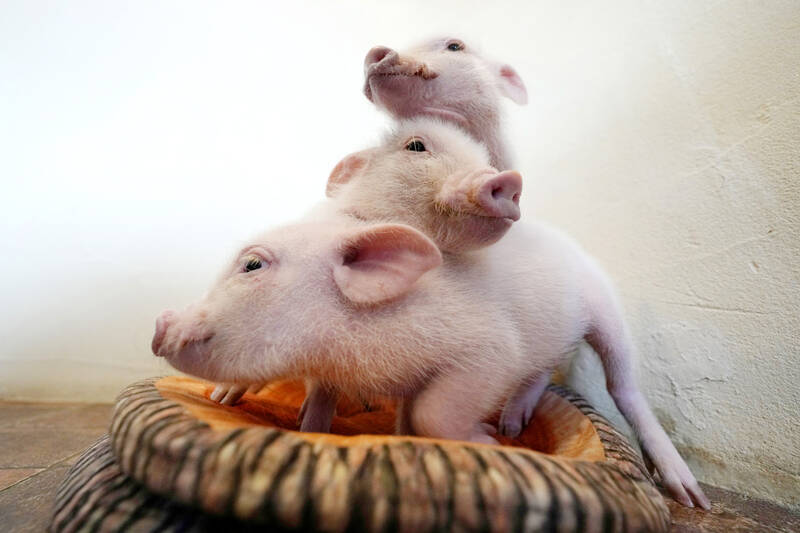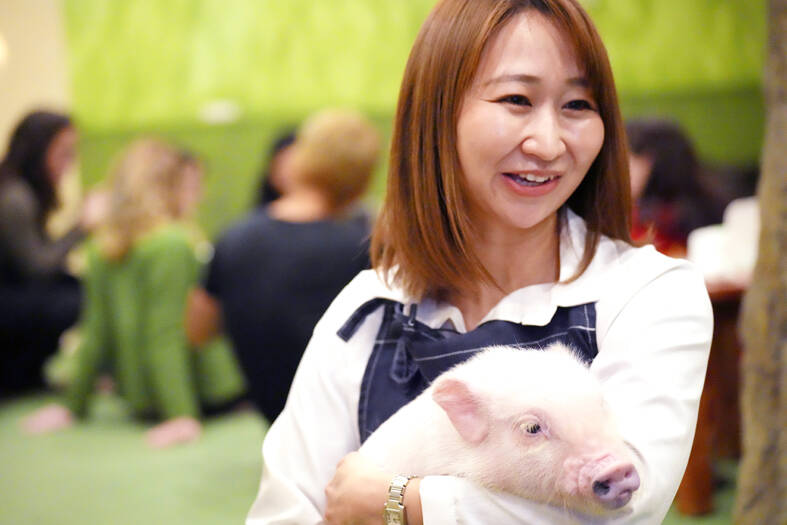First there were cafes that allowed pets. Then came cat cafes, where lattes took second place to feline interaction. The latest craze in Japan: The pig cafe.
“It was wonderful. Very relaxing and enjoyable,” said Brad Loomis, a software engineer from Pullman, Washington, after visiting Tokyo’s Mipig Cafe with his 21-year-old daughter, Paige.
They were among dozens of customers on a recent morning, taking selfies and breaking into huge smiles. The pigs, a miniature breed, trotted about the room, looking for a cozy lap to cuddle up.

Photo: AP
The pigs are surprisingly quiet, although they do snort now and then. They don’t like to be alone, making for great companionship. Unlike the stereotype, they’re very clean and don’t smell.
Customers pay 2,200 yen (US$15) for the first 30 minutes in the company of the pigs. A reservation is required.
“Each pig is unique. Each one has his or her own personality. You may notice one may be strong-headed, and another may be gentle,” said Shiho Kitagawa, an executive at Mipig who refers to the pigs as buta-san, using an honorific.

Photo: AP
The Mipig Cafe in fashionable Harajuku is among 10 such pig cafes the operator has opened around Japan. The first one opened in Tokyo in 2019. Two more are in the works for later this year.
The animals, known as “micro pigs,” don’t get bigger than a corgi dog, even as adults. The cafes also feature adorable baby pigs the size of toy poodles.
IDEAL PETS
Pig lovers say they make great pets. They can be purchased for about 200,000 yen (US$1,350) from Mipig, have already been toilet-trained and are used to being with people. Micro pig food is also for sale. Mipig says it has sold 1,300 pigs as pets.
A drink dispensing machine is in the corner of the cafe, but hardly anyone was bothering to get a drink, being too occupied with the pigs.
Foreign tourists visiting the cafe said they found out about it on Instagram and other social media. The cafe does not invest in advertising. They made sure to include a visit during their trip to Japan, along with the usual tourist spots like the ancient capital of Kyoto, they said.
Australian Ben Russell smiled when a pig finally climbed into his lap. Although this was his first encounter with a real pig, they have always been his favorite animal, he said, although he wasn’t sure exactly why.
Sophie Mo’unga from New Zealand, in Japan with her husband and two children, was a big hit with the pigs, with several of them fighting over her lap.
“They were cute. I think they were all keeping each other warm,” she said.
The pig cafe is the latest in a series of animal coffee shops that have popped up in Japan, including ones that feature owls, hedgehogs, birds and even snakes.
Some people have raised ethical questions about whether the animals enjoy the experience as much as the humans.
“It must be stressful to be touched and fondled by a bunch of strangers,” said Sachiko Azuma, head of Tokyo-based PEACE, which stands for Put an End to Animal Cruelty and Exploitation.
“The animals have become tools for a money-making business,” she said.
Her group mainly opposes animal experiments and “petting zoos.” Cafes tend to be tiny and don’t provide enough of a natural environment for cats or small pigs, and those that entrap wildlife are abhorrent, Azuma said. She approves of cafes run by shelters trying to find owners for abandoned pets.
PIGS FOR WELL-BEING
Bruce Kornreich, professor of clinical sciences at Cornell University’s College of Veterinary Medicine in Ithaca, New York, said interacting with animals can lower one’s blood pressure and reduce headaches and the risk of cardiovascular disease. It also enhances a sense of well-being and helps people cope with stress, he said.
“How they do these things, I’m not sure we know the answer,” said Kornreich, who is also part of the Cornell Feline Health Center, which advocates the study and well-being of cats.
“There is mounting evidence that associating with and owning pets can provide mental health and physical health benefits for people,” he said in a Zoom interview.
Even with dogs, it’s not clear if it’s walking the dog that helps the owner’s health or being in the presence of a friendly animal.
Whatever it is, with dogs or pigs, people are soothed and happy.
“Very cute and very sleepy,” Paige Loomis said of the pigs. “They made me sleepy.”

Words of the Year are not just interesting, they are telling. They are language and attitude barometers that measure what a country sees as important. The trending vocabulary around AI last year reveals a stark divergence in what each society notices and responds to the technological shift. For the Anglosphere it’s fatigue. For China it’s ambition. For Taiwan, it’s pragmatic vigilance. In Taiwan’s annual “representative character” vote, “recall” (罷) took the top spot with over 15,000 votes, followed closely by “scam” (詐). While “recall” speaks to the island’s partisan deadlock — a year defined by legislative recall campaigns and a public exhausted

In the 2010s, the Communist Party of China (CCP) began cracking down on Christian churches. Media reports said at the time that various versions of Protestant Christianity were likely the fastest growing religions in the People’s Republic of China (PRC). The crackdown was part of a campaign that in turn was part of a larger movement to bring religion under party control. For the Protestant churches, “the government’s aim has been to force all churches into the state-controlled organization,” according to a 2023 article in Christianity Today. That piece was centered on Wang Yi (王怡), the fiery, charismatic pastor of the

Hsu Pu-liao (許不了) never lived to see the premiere of his most successful film, The Clown and the Swan (小丑與天鵝, 1985). The movie, which starred Hsu, the “Taiwanese Charlie Chaplin,” outgrossed Jackie Chan’s Heart of Dragon (龍的心), earning NT$9.2 million at the local box office. Forty years after its premiere, the film has become the Taiwan Film and Audiovisual Institute’s (TFAI) 100th restoration. “It is the only one of Hsu’s films whose original negative survived,” says director Kevin Chu (朱延平), one of Taiwan’s most commercially successful

The primaries for this year’s nine-in-one local elections in November began early in this election cycle, starting last autumn. The local press has been full of tales of intrigue, betrayal, infighting and drama going back to the summer of 2024. This is not widely covered in the English-language press, and the nine-in-one elections are not well understood. The nine-in-one elections refer to the nine levels of local governments that go to the ballot, from the neighborhood and village borough chief level on up to the city mayor and county commissioner level. The main focus is on the 22 special municipality